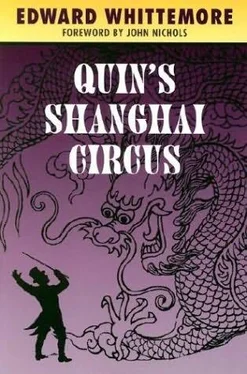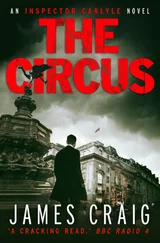Edward Whittemore - Quin’s Shanghai Circus
Здесь есть возможность читать онлайн «Edward Whittemore - Quin’s Shanghai Circus» весь текст электронной книги совершенно бесплатно (целиком полную версию без сокращений). В некоторых случаях можно слушать аудио, скачать через торрент в формате fb2 и присутствует краткое содержание. Жанр: Фэнтези, на английском языке. Описание произведения, (предисловие) а так же отзывы посетителей доступны на портале библиотеки ЛибКат.
- Название:Quin’s Shanghai Circus
- Автор:
- Жанр:
- Год:неизвестен
- ISBN:нет данных
- Рейтинг книги:3 / 5. Голосов: 1
-
Избранное:Добавить в избранное
- Отзывы:
-
Ваша оценка:
- 60
- 1
- 2
- 3
- 4
- 5
Quin’s Shanghai Circus: краткое содержание, описание и аннотация
Предлагаем к чтению аннотацию, описание, краткое содержание или предисловие (зависит от того, что написал сам автор книги «Quin’s Shanghai Circus»). Если вы не нашли необходимую информацию о книге — напишите в комментариях, мы постараемся отыскать её.
Quin’s Shanghai Circus — читать онлайн бесплатно полную книгу (весь текст) целиком
Ниже представлен текст книги, разбитый по страницам. Система сохранения места последней прочитанной страницы, позволяет с удобством читать онлайн бесплатно книгу «Quin’s Shanghai Circus», без необходимости каждый раз заново искать на чём Вы остановились. Поставьте закладку, и сможете в любой момент перейти на страницу, на которой закончили чтение.
Интервал:
Закладка:
Sophia brought Adzhar into the plot because of his knowledge of chemistry. She didn’t love him and he knew it, her obsession with humiliating her father left no room for loving anyone. But when she asked him to design the bombs for the group he agreed. Sophia took his prescriptions to Geneva and smuggled the materials back in a suitcase. Adzhar then put the bombs together in a shoemaker’s shop he had rented on the route through St. Petersburg that the Czar would be using during the first week of March 1881. In all there were eight men and two women in the plot.
On March 1, near the shoemaker’s shop, a bomb was thrown at the Czar’s carriage. The Czar was dazed and stepped down into the street. A second man ran forward and threw a bomb at their feet, killing himself and the Czar but no one else.
Of the plotters one man was killed in the explosion, one shot himself, two escaped, and the remaining men and women were sentenced to death. Because of Sophia’s rank Alexander III himself had to sign her death warrant. He was reluctant to do so, but his courtiers persuaded him out of fear that she might reveal their indiscretions with her. As it turned out she said nothing. She had disgraced her father and that was enough. She was hanged without betraying anyone.
Adzhar, one of the two men who had escaped, was then in his early twenties. The news of Sophia’s execution reached him in Helsinki, where he had gone into hiding. He also learned that the Russian government was sending agents abroad to try to catch him and the other man.
Adzhar knew he had to find as remote a spot as possible, so he went north to the land of the Lapps. For the next half-dozen years he lived with the Lapps in isolation, wandering with them and their reindeer herds across the wastes of the Arctic Circle. When he left them he went to Iceland and worked as a shoemaker. While with the Lapps he had learned Lappish, an Asian language, as well as the Scandinavian tongues. Now he learned Icelandic. He still had not forgotten Sophia, and the discipline of learning languages, he discovered, was a way of putting aside his unhappiness.
After a half-dozen years reading the Icelandic sagas he went to the Faroe Islands and learned Faroese, then to the Isle of Man to learn Manx. During this period he also acquired Gaelic, Scottish Gaelic, Welsh, and English. With English behind him he went to America, as did so many East Europeans at that time.
The St. Petersburg uprising of 1905 came and went, as did the artillery pieces later placed around the Shinto shrines in Japan. In New York he met Trotsky, the hero of the 1905 uprising who was now traveling to various countries soliciting aid for his cause. Although Trotsky was nearly twenty years younger than Adzhar, he revived Adzhar’s political idealism.
One evening there was a famous encounter between the two men that resulted in Adzhar delivering his incredible prophecy, a prophecy that later caused Trotsky to give him his remarkable code name.
It happened in the Bronx. Trotsky had gone to Adzhar’s shoemaker’s shop for blintzes and borscht. Trotsky was in a bad temper that evening because he had spent the day working on his history of the 1905 failure. He refused to eat anything, and all the food, which Adzhar had spent the day preparing, seemed about to go to waste. Adzhar decided to enliven the gathering with a story. Trotsky replied that there wasn’t a story in the world that could lift his gloom at that moment. Adzhar smiled and answered in an unknown tongue.
What’s that? asked Trotsky.
Passamaquoddy, said Adzhar.
What?
An Indian tribe, a branch of the Algonquins. I lived with them for a few weeks one winter in order to pick up their language.
And what did you learn in this useless tongue?
How the world was created.
How?
Like this.
Adzhar recounted the epic. He told it first in Russian and then in the original Passamaquoddy. As related by Adzhar, the exploits of the central character strongly resembled Trotsky’s life up until then. Trotsky listened more and more intently, delighted to hear his struggles described in such an odd-sounding language. Although he didn’t believe for a moment that Adzhar’s version was authentic, he still found it amusing to imagine that a half-naked Indian with a bow and arrow and a feather in his hair had once experienced in North America the same struggles he was now undergoing in Russia. He laughed and joked and ate quantities of blintzes and borscht. By the end of the evening he had forgotten all about 1905 and was talking enthusiastically about the next uprising, which he was certain would succeed.
When will it come? asked someone.
Trotsky frowned. He calculated. He searched for obscure quotations from the holy books of revolutions. He was about to squeeze all of history into one ironbound Marxist harangue when his gaze happened to fall on Adzhar. What stopped him then? The mischief in Adzhar’s eyes? The slight smile that was always hovering around the little man’s mouth?
The harangue never came. The frown flew from Trotsky’s face and he burst into wild laughter, the kind of unrestrained, totally goodhumored laughter seldom heard from a dedicated revolutionary whose work, like that of God’s, leans heavily on the serious side of life.
Adzhar, he said, your blintzes were superb tonight. Your borscht was excellent, and what’s more you’ve already answered that question for me, for mother Russia and the world. How long did you say your brave Passamaquoddy labored in his act of creation?
A dozen years.
Just so. Well we failed in 1905 and that means we will succeed in 1917.
Adzhar winked. Once more Trotsky went off into a burst of wild laughter. In revolutionary circles around the world Trotsky was often called The Pen because of the power of his writing. He made reference to this now.
Adzhar, he said, on the basis of that epic you told us tonight you should always be known as The Holy Ghost , and if you ever join us that’s what your code name will have to be.
The two men embraced, Trotsky insisting that a photograph be taken in order to memorialize the evening of Adzhar’s prophecy.
When the Third International was founded in 1919 The Holy Ghost was in Paris working for Trotsky, using his knowledge of French and German and Italian and Spanish, Hebrew, Hungarian, Lithuanian, Lettish, Flemish, Dutch, Romansh, Slovak, Serbo-Croatian, and several other tongues to recruit European agents and pass information from one movement to another. A Guatemalan, for example, spoke only his native Tzotzil dialect, and if Adzhar hadn’t learned Tzotzil in a cafe one afternoon in order to talk to the man the Comintern would never have known of the existence of this potentially valuable agent in Central America.
An innovation of his in Paris was a unit of moles , Jewish tailors he brought from Odessa and taught to make clothes characteristic of various regions in the world, and to plant ticket stubs and tobacco and other items in the linings of the pockets, so that Comintern agents could travel freely without fear of being recognized.
In 1919 he returned briefly to Russia to see Trotsky and was almost shot at the border as a White Russian. Fortunately he had with him the photograph taken at the shoemaker’s shop in the Bronx that showed him and Trotsky arm in arm beaming at the camera. He presented it to the guards and it saved his life.
Back in Paris one of his many new recruits was a young American who had been wounded in the First World War and wanted to end all wars. Quin, shall we call him? Adzhar even knew the neighborhood in the Bronx where the young man had grown up, for it happened to be the same as that of the shoemaker’s shop in the photograph.
He found Quin an intelligent young man, confident of himself, eager to learn, and eager to put his skills to work. He also found his enthusiasm naive perhaps, but Adzhar wasn’t so old that he couldn’t remember his own feelings when he left Tifiis and went to St. Petersburg.
Читать дальшеИнтервал:
Закладка:
Похожие книги на «Quin’s Shanghai Circus»
Представляем Вашему вниманию похожие книги на «Quin’s Shanghai Circus» списком для выбора. Мы отобрали схожую по названию и смыслу литературу в надежде предоставить читателям больше вариантов отыскать новые, интересные, ещё непрочитанные произведения.
Обсуждение, отзывы о книге «Quin’s Shanghai Circus» и просто собственные мнения читателей. Оставьте ваши комментарии, напишите, что Вы думаете о произведении, его смысле или главных героях. Укажите что конкретно понравилось, а что нет, и почему Вы так считаете.












